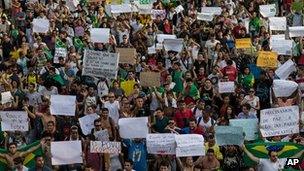Dilma Rousseff to address Brazilians over protests
- Published

Brazilian President Dilma Rousseff is set to address the nation over the country's worst unrest in two decades.
Earlier on Friday she held an emergency cabinet meeting to discuss how to end more than a week of protests.
They began as demonstrations over transport fare rises in Sao Paulo, but quickly grew into nationwide rallies against corruption and other issue.
More than a million people are reported to have taken part in demonstrations on Thursday in about 100 cities.
In some cities, police used teargas and rubber bullets to disperse the crowds.
One man died when a car drove through a barricade in Sao Paulo state, and a woman died of a heart attack after collapsing during demonstrations in the northern city of Belem.
More protests are expected on Friday, and demonstrators have begun marching again in Sao Paulo, Rio de Janeiro and other cities, where some shops have closed for fear of further violence.
Pressure mounts
President Rousseff initially praised the demonstrators, saying she was proud so many people were fighting for a better country.
But since then, she has sought to distance herself from the protests despite coming under mounting pressure to make a definitive statement on the issue.
The BBC's Julia Carneiro in Rio says the president has been criticised for keeping silent over the discontent in recent days.
Her cabinet meeting in the capital, Brasilia, ended after about two hours with no official comment, but she is to address the nation soon.
Her spokesman, Bruno Vanhoni, told the BBC that the protesters' demands were "things we in the government want too", and added that the government was trying to organise talks with protest leaders.
On Thursday night, demonstrators tried to storm the foreign ministry in Brasilia. They were driven back by police, who fired rubber bullets and tear gas.
In Rio, at least 29 people were reported injured after clashes between riot police and groups of masked young men trying to approach city hall.
Belem

In the city of Belem - at the mouth of the Amazon River - riot police clashed with stone-throwing protesters. Demonstrators also hung protest banners and flags on City Hall.
Brasilia

In the capital Brasilia, demonstrators targeted government buildings around the city's central esplanade. Police used tear gas and rubber bullets to try to scatter the crowds.
Belo Horizonte

Police and protesters clashed in the eastern city of Belo Horizonte, which hosted a game in the Confederations Cup - the warm-up tournament for the World Cup.
Sao Paulo

The widespread demonstrations taking place across the country followed a police crackdown on smaller protests in Sao Paulo, which galvanized Brazilians to take to the streets. The city saw thousands gather once again near the city's landmark Avenida Paulista late on Thursday.
Fortaleza
At least 30,000 people rallied in the north-eastern city of Fortaleza ahead of the Confederations Cup game with Mexico this week. Brazilian police fired tear gas and rubber bullets to disperse protesters.
Salvador

There were clashes outside a football stadium in Salvador ahead of a Confederations Cup football match between Nigeria and Uruguay. Police used tear gas and rubber bullets to disperse crowds.
Rio de Janeiro
Rio de Janeiro has seen some of the worst unrest. Late on Thursday, police fired tear gas and rubber bullets at groups of masked young men trying to approach the City Hall. A number of people were injured.
Porto Alegre

Earlier this week, more than 40 people were arrested in the southern city of Porto Alegre after a small group peeled away from a protest march of about 10,000 demonstrators to attack shops.
TV footage showed gangs looting shops in the city centre - although many shopkeepers and banks had put up wooden hoardings to protect their premises.
There were also clashes in the north-eastern city of Salvador; in Porto Alegre, in the south; and in Campinas, north of Sao Paulo.
The protests, originally triggered by an increase in bus fares on 2 June, have since grown into a much wider movement.
Protesters are angry at corruption and poor public services, as well as the huge cost of next year's football World Cup, saying the government should also invest in education and healthcare.
Sao Paulo, Rio, Recife and Joao Pessoa are among the cities to have reversed the fare increases.
However, Sao Paulo Mayor Fernando Haddad warned that the move was a "big sacrifice", which meant investments would have to be cut.
Some of the protests have targeted the Confederations Cup, the eight-team tournament which is considered a dry run for next year's World Cup.
Demonstrators have expressed their anger at steep ticket prices and the money spent on both tournaments, as well as the 2016 Olympic Games, which Rio de Janeiro is hosting.
Football's world governing body, Fifa, has strongly rejected Brazilian media speculation that the Confederations Cup could be cancelled.
No matches are for scheduled for Friday. Play is due to resume on Saturday with Italy facing Brazil in Salvador and Japan playing Mexico in Belo Horizonte.


